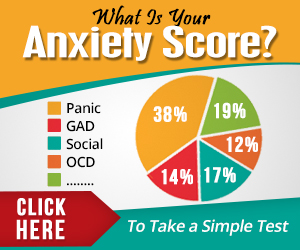Many people who have generalized anxiety disorder, and those that experience high levels of anxiety or panic attacks on a regular basis, struggle with sustaining a productive and balanced lifestyle. Simple activities such as driving a car or going shopping can create very strong feelings of anxiety, and may even lead to a panic attack. A fear of driving or driving phobia is a common side effect of anxiety disorders for many people, but there are some ways to overcome it so that day-to-day living doesn’t become so overwhelming. Driving phobia is defined as an intense fear of driving a
Read more
If falling asleep has become one of the most challenging parts of your day, you’re not alone. Thousands of people that suffer from anxiety and panic attacks find it very difficult to end their day comfortably and may not be getting enough high quality sleep on a regular basis. Sleep deprivation not only makes you more irritable and tired the following day, but may also be the reason why you’re experiencing high levels of anxiety on a regular basis. Fortunately, there are some ways to sleep better tonight, and every night. I talk more about ways to break out of
Read more
For many people who suffer from panic attacks and experience high levels of anxiety, mornings can be a particularly stressful time of day. Some people find themselves always getting up in a frantic state, while others feel very depressed and experience a heightened state of worry upon waking. If mornings are particularly difficult for you, you need a strategy for getting your day off to a healthy start. I talk more about starting the day right in my book, Panic Away, and you can start implementing these strategies right away: 1. Start with a light stretch. Stretching will help increase
Read more
Do you wake up in a highly anxious state? Is it hard for you to focus and get control over your thoughts after a meal? If the answer is yes, one of the critical links related to your anxiety could be traced to your diet and your blood sugar levels throughout the day. If you have a history of diabetes or other health conditions that cause low blood sugar, you may be more vulnerable to high anxiety, stress and even a panic attack at certain times of the day. Many people who are suffering from hypoglycemia experience anxiety on a
Read more
For many people suffering from high levels of anxiety and frequent panic attacks, enjoying a peaceful state of mind seems like an impossible task. The constant mental activity can make it very hard to focus and concentrate. The constant mental activity can also be the root cause of an imbalance that leads to stress, frequent anxious thoughts and even compulsive behavior. I’ve found that one of the easiest ways to reduce anxiety is to deliberately shift your attention from your head, to your heart. You can do this simply by practicing the “art of gratitude” which I talk about in
Read more
For many people who deal with anxiety and panic attacks on a regular basis, nighttime can be a particularly difficult time of day because they are unable to fall asleep naturally. Not getting enough sleep can take its toll on your health and well-being, and can even increase the risk of an anxiety or panic attack in the near future. People stay awake at night for a number of reasons. They may be fearful or worried about an upcoming event, or they might simply be worried that they can’t sleep and won’t be able to perform at their best the
Read more
Alleviating mental anxiety you experience upon waking isn’t always easy. How often do you get up in an anxious state? Do you feel calm and well-rested when you first wake up, or is your mind just reeling with thoughts and ideas? If you suffer from frequent anxiety attacks and panic attacks, it’s likely that you experience a high level of stress and anxiety shortly after waking. The good news is, you can use this energy in a positive way and clear out those mental blocks before you tackle the day ahead. Julie Cameron talks about writing “Morning Pages” in her
Read more
Click play to hear Barry explain this anxiety sensation. Sometimes people who are making good progress with their anxieties experience a setback when they come down with either a head cold or the flu. The reason for this is because, as the body wards off the cold or flu, it makes the people feel drained and vulnerable. To people with anxiety, this can feel unnerving because it may remind them of how they felt during an intense spell of anxiety. Colds and flu also come with an almost claustrophobia-like sensation of being congested up in your head. Try to remember
Read more
Click play to hear Barry explain this anxiety sensation. There are a number of different phobias related to the toilet, but here I’m going to discuss one of the most common: the fear of not getting to the toilet on time. No one should feel ashamed of this problem; it’s common and can be overcome. This fear is almost always connected to social embarrassment, and it rarely happens in situations where other people are not around. Anxiety can give people the impression that they have a weak bladder. When anxious, they may need to use the toilet several times. In
Read more
Click play to hear Barry explain this anxiety sensation. When panic attacks begin, people often feel a tingling sensation in their body. The medical term for this is paresthesia. More generally known as the feeling of pins and needles, it’s a sensation of tingling, pricking, or numbness of the skin, and it has no apparent long-term physical effect. Paresthesia is most commonly felt in the hands, arms, mouth, and feet. Don’t be alarmed; this is perfectly natural to experience in connection with high anxiety.
Read more
Click play to hear Barry explain this anxiety sensation. Anxiety creates the sensation of weak or “jelly” legs. When anxious, adrenaline is released into your body. The adrenaline can make sensitive people feel very weak in their muscles—especially the leg muscles, because they’re supporting the body. You often hear people say that when they have to stand up and speak, they go weak at the knees and fear they might topple over. It’s important to note, however, that the jittery sensation you may feel in your legs is not a signal that your legs are any weaker—they’re not. In fact,
Read more
Click play to hear Barry explain this anxiety sensation. When frightened or anxious, the pupils in the eye dilate quickly, and this can sometimes cause blurred vision. Blurred vision can also occur when looking quickly between near and far objects, because the pupils change dimension. Blurred vision is also often caused by fatigue or when the eye muscles start to lose elasticity with age. Even though anxiety can frequently cause instances of blurred vision, it’s important to visit your doctor for an eye checkup. For example, if the blurred vision occurs with a discharge, it may be conjunctivitis and need
Read more



